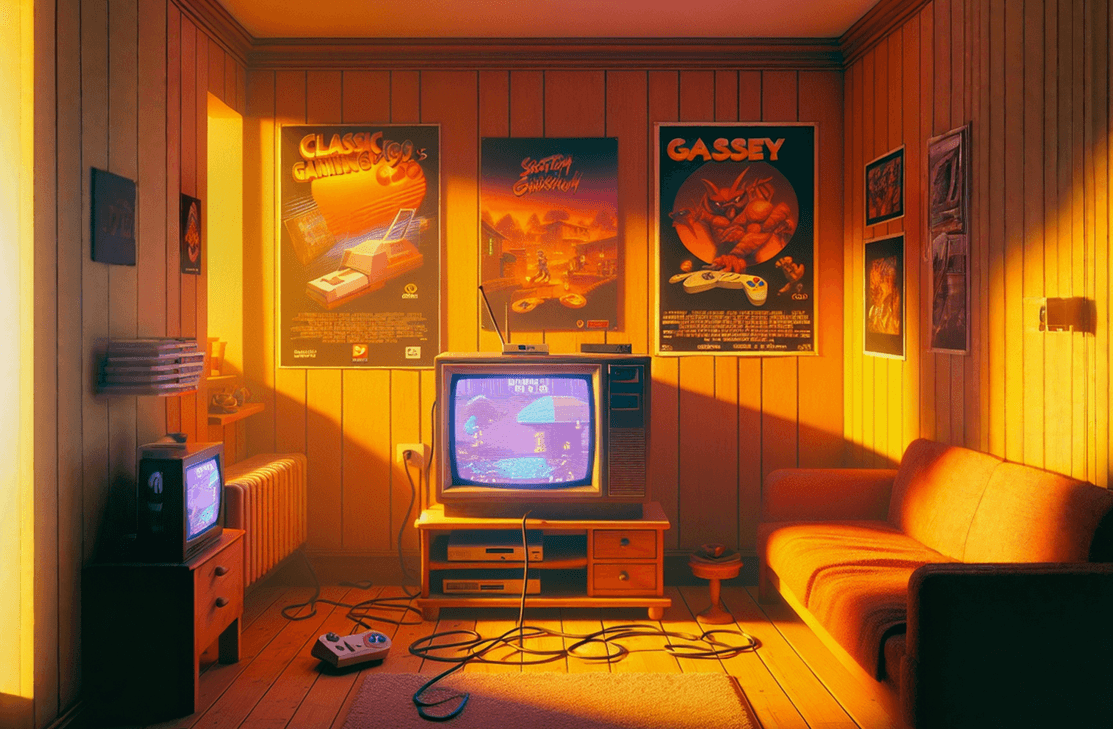Are New Games Losing Their Edge? The Enduring Brilliance of Classic Games
Hind MoutaoikiIR&D Manager
Fri Jun 27 2025

There's a moment that comes to every gamer—perhaps whilst scrolling through endless digital storefronts or watching yet another trailer for the latest blockbuster—when a profound question surfaces: are we still creating magic, or merely chasing shadows of former glory?
The data speaks with uncomfortable clarity. The five highest-rated video games of all time all emerged from gaming's earlier chapters. The Legend of Zelda: Ocarina of Time, crowned with a perfect 99 Metascore in 1998, sits atop a pantheon that includes SoulCalibur (1999), Grand Theft Auto IV (2008), and the Super Mario Galaxy duology (2007-2010). This isn't merely nostalgia speaking—it's a numerical testament to something we've perhaps lost along the way.
But before we surrender to melancholy about gaming's supposed decline, let us consider what this ranking truly reveals about the medium we love, and more importantly, what it promises for tomorrow.
The Alchemy of Constraint
Those who lived through gaming's transformative decades will recall the peculiar magic that emerged from limitation. When Shigeru Miyamoto crafted Ocarina of Time, he wasn't working with unlimited resources or photorealistic graphics. He was wrestling with the constraints of 1990s hardware, transforming restrictions into revelations. Every polygon mattered, every musical note was precious, every gameplay mechanic had to justify its existence.
This wasn't merely technical necessity—it was creative alchemy. The developers of that era couldn't rely on spectacle to mask shallow gameplay or cinematic cutscenes to substitute for meaningful interaction. They had to distill their vision to its purest essence, creating experiences that resonated not through sensory overload but through emotional truth.
Consider the enduring power of GoldenEye 007 or the original Grand Theft Auto III. These weren't games trying to be everything to everyone. They were singular visions, uncompromising in their focus, revolutionary in their simplicity. They didn't merely entertain—they redefined what interactive entertainment could be.
The Modern Predicament
Today's gaming landscape presents a different sort of challenge. The global games industry experienced modest growth in 2024, with revenue increasing by 2% to reach $187.8 billion, yet this commercial success hasn't translated into the kind of transcendent experiences that dominated the early rankings.
We live in an age of unprecedented capability. Modern games can render entire worlds with breathtaking fidelity, support millions of concurrent players, and deliver experiences that would have seemed impossible to the creators of Ocarina of Time. Yet something essential appears to have been lost in translation between possibility and practice.
The issue isn't technical—it's philosophical. When every imaginable feature is possible, the question becomes not what can we include, but what should we include? When budgets stretch into the hundreds of millions and development teams number in the thousands, the intimate creative vision that shaped gaming's greatest masterpieces becomes increasingly difficult to maintain.
Lessons from the Pantheon

What can we learn from gaming's highest-rated classics? They share certain qualities that transcend their technical specifications:
Singular Vision: Each emerged from a clear, uncompromising creative vision rather than committee design or market research.
Mechanical Purity: Their core gameplay loops were refined to near-perfection, prioritising feel over feature lists.
Emotional Resonance: They created genuine emotional connections with players, not merely impressive technical demonstrations.
Cultural Timing: They arrived at moments when the medium was ready for their particular innovations, becoming catalysts for broader change.
Iterative Excellence: They built upon existing foundations whilst introducing meaningful innovations, respecting tradition whilst embracing progress.
The Future's Promise
The dominance of pre-2010 games in today's rankings doesn't represent gaming's failure—it represents its adolescence reaching maturity. Every artistic medium experiences periods where foundational works cast long shadows over subsequent creations. Film still grapples with the influence of Citizen Kane, literature with Shakespeare, music with Bach.
Gaming's challenge isn't to recreate the past but to understand what made those classics endure. The online gaming market is expected to reach $388.10 billion by 2033, suggesting unprecedented resources for creative expression. The question isn't whether gaming can recapture its golden age—it's whether we can transcend it.
A Call to Creators
To those who dream of crafting tomorrow's classics: remember that the greatest games weren't born from attempting to please everyone but from daring to mean something to someone. They emerged not from safe choices but from bold leaps into uncharted territory.
The tools of creation have never been more accessible, the audience never more diverse, the possibilities never more limitless. What's needed isn't more powerful hardware or larger budgets—it's the courage to pursue vision over vanity, substance over spectacle.
The next Ocarina of Time won't look like the original—it will capture its spirit whilst speaking to contemporary hearts. It will emerge not from nostalgia for the past but from hope for the future, created by developers who understand that gaming's greatest achievements have always been about the human experience, not the technological one.
The golden age of gaming isn't behind us—it's waiting to be rediscovered by those brave enough to remember what made games magical in the first place. And in that remembering, we might just find the keys to tomorrow's masterpieces, games that will inspire future generations to look back and wonder how we achieved such impossible beauty with such humble means.
The edge isn't lost—it's simply waiting to be sharpened anew.
previous
What Would Charles Dickens Say to Teachers?
next
What Does Nothing Look Like? A Journey into the Heart of Emptiness
Share this
Hind MoutaoikiI
R&D Manager
Hind is a Data Scientist and Computer Science graduate with a passion for research, development, and interdisciplinary exploration. She publishes on diverse subjects including philosophy, fine arts, mental health, and emerging technologies. Her work bridges data-driven insights with humanistic inquiry, illuminating the evolving relationships between art, culture, science, and innovation.










